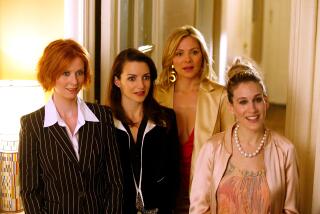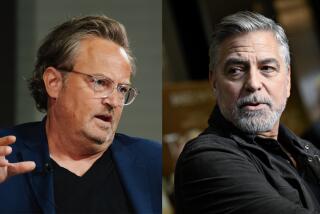Critic’s Notebook: Has TV matured to the ‘just friends’ stage?
Way back when the world was young and romantic comedies opened at theaters every weekend, “When Harry Met Sally” had everyone talking, and not just because of that famous deli scene. Within minutes of meeting Sally (Meg Ryan), Harry (Billy Crystal) flatly states that women and men cannot be friends, because no matter what sort of relationship is occurring on the surface, deep down all the men are interested in is having sex. Even with the women they don’t find attractive.
Inevitably, he is proven wrong and right — he and Sally become friends before succumbing to their obvious deep and true love for each other — but for months it was a major topic of conversation.
Could men and women ever really be “just friends”? It’s a question with which we still, apparently, struggle; if contemporary TV is any indication, the answer is “no,” or at least “so seldom that when it occurs some TV critic may be moved to write an essay about it.”
Sexual tension is a wonderful thing, but it has gotten to the point that when a show debuts with two single attractive people of the opposite sex (and occasionally the same sex) in the same workplace/dramatic mileu, at least part of the narrative arc will be a countdown to coitus, or, in earlier more innocent times, the Kiss.
There may be seemingly irreconcilable personality contrasts or other ancillary romantic interests, but in the end, Booth (David Boreanaz) gets Bones (Emily Deschanel) just like Mulder (David Duchovny) got Scully (Gillian Anderson) (though not permanently) and “Moonlighting’s” David Addison (Bruce Willis) got Maddie Hayes (Cybill Shepherd). Heck, even Hawkeye (Alan Alda) and “Hot Lips” (Loretta Swit) had their moment, albeit late in “MASH’s” 11-season run. And don’t get me started on “Friends,” which wound up like a Jane Austen novel, with everyone married to practically everyone else.
Which makes any attempt to depict nonsimmering, inter-gender friendships both odd and admirable. “Will and Grace” was the first and possibly only successful show to showcase a nonsexual friendship between a man and woman — but of course this was achieved by making Will (Eric McCormack) gay, a convenient twist that has become increasingly ubiquitous and not just on shows starring Debra Messing (although “Smash” uses it unapologetically and to great effect).
“Parks and Recreation’s” (Amy Poehler) manages to have several platonic relationships with men, most notably Ron Swanson (Nick Offerman). They treat each other more like siblings, armed with equal (and often libido-quenching) amounts of personal information and affection. On “Mad Men,” the Lothario Don Draper (Jon Hamm) has managed, apparently without much difficulty, to keep his mitts off both Peggy (Elisabeth Moss) and Joan (Christina Hendricks). Peggy may still harbor a secret crush, but increasingly she appears to see Don as he is — a hazard to any female in close proximity to his sheets — something Joan has known all along.
Although potential romance abounds on the shows of the new season, several consciously buck the trend. Zooey Deschanel’s Jess may have some long-run romantic potential with Nick (Jake M. Johnson) on “New Girl,” but her current relationships with her three male roommates are so far from roiling with sexual tension that they are practically sexual-tension dark matter. All four of the main characters are sexually and romantically active and quite open about it in their conversation. So open, in fact, that it may be one of the most graphic yet least titillating shows on television, something that serves its comedic tone quite well.
On a different wavelength entirely is “Alcatraz,” in which Det. Rebecca Madsen (Sarah Jones) teams with Doc, a fanboy Alcatraz expert (Jorge Garcia) and Emerson Hauser, a mysterious federal agent (Sam Neill), to track down criminals who have returned to San Francisco after vanishing 50 years ago. A more typical trope would have Rebecca eventually drawn to one or the other, but none of the characters are cut that way. Hauser appears rather grimly infatuated with the equally mysterious psychologist Lucy (Parminder Nagra) while Rebecca and Doc are truly just friends. A more cynical mind could put this down to Doc’s size — Garcia, though an endearing performer, is not a romantic lead — but it’s Rebecca who sets the all-business tone. As attractive as Jones is, her Rebecca is about as sexy as Joe Friday.
Other shows — “Happy Endings,” “Suburgatory” — flirt with the subversive by upending expectations and possibilities, while “Fringe” explores the nature of real love versus one perhaps manufactured through the false impression of shared experiences. But for the most part, dramas and comedies are aided if not completely propelled by the not-if-but-when issue of having a male and female lead.
Which usually works, but here’s to the shows attempting something different. Something we’ve all experienced at least once in our life — a friend of the opposite sex whom we love to death but are not dying to sleep with.
More to Read
The biggest entertainment stories
Get our big stories about Hollywood, film, television, music, arts, culture and more right in your inbox as soon as they publish.
You may occasionally receive promotional content from the Los Angeles Times.







